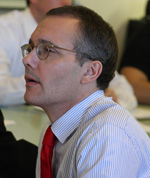Is an all-Gay High School Constitutional?
In the social sciences, experimentation is always difficult. Unlike other sciences, holding other things constant and altering single variables is not practical. As Political Science Professor Paul Vasquez said "you can’t light nationalism on fire with a Bunsen burner."
 Hypothetical questions are the social scientist’s controlled experiments; to those who have taken any of Professor Scott Himsel’s Constitutional Law courses, the hypothetical – would an all gay high school be constitutional? That was the question posed to the large gathering of students, faculty, staff and Wabash Community members for the Social Sciences Colloquium Thursday.
Hypothetical questions are the social scientist’s controlled experiments; to those who have taken any of Professor Scott Himsel’s Constitutional Law courses, the hypothetical – would an all gay high school be constitutional? That was the question posed to the large gathering of students, faculty, staff and Wabash Community members for the Social Sciences Colloquium Thursday.
"Hypothetical questions are particularly good if you want to practice law," Himsel said, "but, in some ways, I like having students who will never practice law because this is their only opportunity. It’s just another way to get at the liberal arts through the lens of the law."
In Himsel’s hypothetical question, an urban school district created a publically funded all gay high school; the school had slots available for only 100 students who had been harassed or harmed because of their sexual orientation. The petitioner, however, was a straight student who wanted to go to the school because he was being harassed for his perceived sexuality; students thought he was gay because of his heavy emphasis on theater and music. The all-gay high school denied the straight student admittance because the student was straight.
The question was does the student have a claim of a violation of the Equal Protection Clause of the Constitution’s Fourteenth Amendment?
Himsel provided the group with what he called a refresher of Equal Protection "in a Ferrari" and briefly ran through the court precedents regarding Equal protection, including the famous cases Plessy v Ferguson and Brown v Board of Education; the Michigan Law School Affirmative Action case Gratz v Bollinger; and the most recent case on homosexuality from 2003, Lawrence v Texas.
Himsel crafted his question in such a way that there was no easy way out of the case; and students, professors and staff wrestled with the question for over an hour. Students who had taken Himsel’s course perhaps had the upperhand – this question, in fact was their final exam. For the final, students have three hours to read the opinion, write the majority opinion for the court, and then dissent from their own opinion. Arguing both sides of a case at the same time, in Himsel’s mind, is the only real way to understand the case.
"The law is everywhere," Himsel said. "This business of having to figure out a problem or, as my friend Bill Placher used to say, take a walk all the way around the problem is an excellent way to look at the liberal arts."
At the end of the colloquium, no consensus was reached on the one way to go about a case like the one presented. Even though the straight student is facing discrimination, does his discrimination rise to a level where it demands protection, like in the case or racial discrimination? Can you even make an equal protection based on homosexuality if you are not in fact gay? The group gathered wasn’t provided an answer, but that was not the reason of examining the hypothetical question.
"(Hypothetical questions) are an opportunity to say to students ‘you’ve read the stuff, you’ve thought about this stuff and now it’s your turn,’ Himsel said. "What I want to do with this teaching technique is to allow students make their own way with this material, offer their own insights, make it their own; enter the story and figure out how to make order out of it."